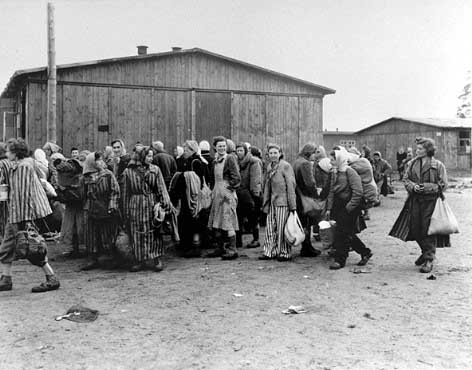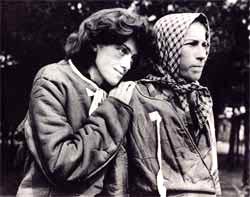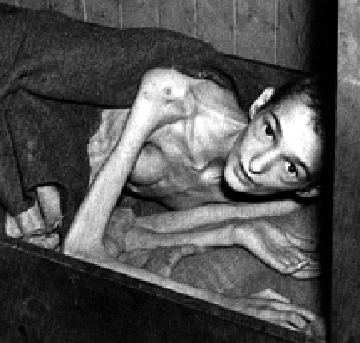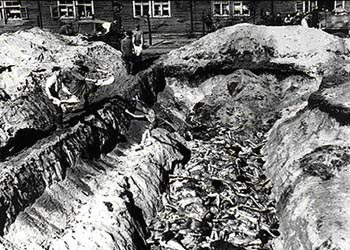What was it like in Bergen-Belsen?"Wednesday, April 26, 12:30 p.m. Our treatment improved visibly. The greatest advantage was that we did not have to work. For the first time in a long while we were able to rest, which did us all a lot of good. The tone of the "Greens" (German criminals on the camp staff who wore green badges and helped the SS) towards us had become manifestly more accommodating. To our surprise we noticed that some of the SS men who had only bellowed at us so far were also capable of speaking to us in a normal tone of voice. Small mistakes were no longer punished, and the daily roll-calls became a brief formality. However, the quality and quantity of the food remained the same. In our seclusion we felt the hunger even more strongly, since we had time all day long to think of our empty stomachs." Simon Heinrich Herrmann (one of the 222 Jews who were sent from Bergen-Belsen to Palestine in June 1944), excerpt from his book, "Austauschlager Bergen-Belsen," published in Tel-Aviv in 1944  In 1943, Bergen-Belsen was set up as an exchange camp for the purpose of trading Jews for German citizens being held by the Allies. Two days before Germany declared war on America, a group of German-Americans who were Nazi supporters and a number of German citizens living in America had been rounded up and sent to an internment camp at Ellis Island in New York. Later a number of German citizens were apprehended in South America and brought to the American internment camp. After the war started, these prisoners were available for exchange with the Germans for prisoners being held in their camps, although America did not have much interest in bringing German Jews to America. Immigration laws had been passed in 1920 and 1921 that were designed to keep Jews out of the USA; throughout the persecution of the Jews in Nazi Germany, Congress would not amend those laws to allow more Jews to come here as refugees. Very few exchanges were made, but there was one group of 222 Jews who finally made it to Palestine, arriving on July 10, 1944. They had been released by the Germans in an agreement with the British whereby German citizens held as prisoners were allowed to come back to Germany. The group that ultimately went to Palestine was first scheduled to begin preparations on May 31st for the trip, but the deal was canceled by the British on June 5th, the day before the Allied landing at Normandy. The Palestine Jews, who had been in a special barracks awaiting departure, were sent back to the general camp. All their new privileges were taken away and they were forced to work again, just like the other prisoners in the camp. Simon Heinrich Herrmann, whose book is quoted above, was one of the lucky 222 who finally made it to Palestine. Here is another excerpt from his book: Several weeks passed by, and slowly we got used to the daily grind of camp life again...Thursday, June 29th, 6 in the morning. We were about to go to work when a "Green" appeared in our hut shouting, "No one to work!" We were struck as if by lighting. So, after all! Without preparation the message hit us: we were being freed. The answer was a wild outbreak of joy. The children became uncontrollable. Suddenly our innermost feelings were switched over into another world. In a minute a revolution had taken place. [...] After the luggage check followed by a body search, which was performed no less painstakingly, the contents of all pockets being emptied on the table, and all our clothing felt over from top to bottom. In doing so, the Germans gave a last demonstration of their ingenuity in verbal abuse, once again drumming into our heads that we belonged to the class of swindlers and thieves. Immediately afterwards we received our provisions for the first stage of our journey, which considerably exceeded our camp rations. The worst had passed. At the German border we were supposed to be handed over in a condition more or less worthy of human beings. Our treatment improved with every meter that we came closer to this border. In the evening our camp balance, precise to the last penny, was also handed over to us in Reichsmarks (German money). On the floor of the garage we then spent our last night in the Bergen-Belsen camp. Another prisoner at Bergen-Belsen was 25-year-old Renata Laqueur, who was born November 3, 1919, the daughter of a Professor of Pharmacology in Amsterdam. She was arrested in 1943 and taken, along with her husband, to the Dutch transit camp at Westerbork. From there, she was sent to Bergen-Belsen on March 15, 1944 in a transport of Dutch "exchange Jews." She kept a diary in the camp and after the war, it was published in Amsterdam in 1965 under the title, "Dagboek uit Bergen-Belsen maart 1944 - April 1945". The German translation was published in Hannover in 1983 under the title, "Bergen-Belsen-Tagebuch 1944/1945." Quoted here are two excerpts from Renata Laqueur's Diary: Sunday May 28, 1944 (Whit Sunday) It is about half past five in the evening, and I am sitting outside in the open air, between the barracks, with my back towards the barbed wire. It has been terribly hot since yesterday. In the evenings and at night the hut is an oven. A hundred and eighty people, one single toilet - without a door on top of that - open chamber pots and buckets under the beds, laundry, clothes and other items hang in the narrow space between the three-layered bunk beds and from the ceiling. Dust, dirt, heat and stench. I am now enjoying the first quiet moments in months. The work squads have already marched into the camp. But most of them are too exhausted to take a breath of fresh air for a moment, since we have to get up again tomorrow at half past four. Here it smells of forest, summer, freedom. On the left hand, behind the barbed wire fence, there are pine trees, slender and motionless. There must be a dark, safe, cozy little place, between the small bushes on soft moss and pine needles. And it is so quiet there, so quiet...But in front of it there is a barbed wire, and the skull grins at me, bars the way to liberty. I hear the sentry walk up and down on his watch tower whistling a ditty. He must be almost dying of boredom. Why, why is all this happening? Soon now I will be able to sleep until half past four. No more thinking. The day must come again when there are no more barbed wire fences, when we can go where we want, go to bed when we please, lead a life without coercion and oppression. I still have a fever and am weak because of the diarrhea. Tomorrow another eleven hours of sitting. We are now sorting buttons for "army underwear". Brain work! I must now get back into my hut. It is as if one was getting into a car which has been standing in the scorching sun for a whole day. Thursday,
June 15, 1944. I think a lot about what the time after the war
will look like. Will we be at all able to tell anything to somebody
who has not gone through the same experience as we have? Can
we put into words what this camp experience means to us? What
it means to watch from behind barbed wire how slender pines grow
and how fresh foliage and green leaves sprout alongside the camp
street. What the perpetual coercion and harassment of the SS
guards and their incessant regime and surveillance mean. How
you are always making an effort to imagine: this does not concern
you yourself, all of this screaming scolding, din. How you feel
that you are growing older, that your youth runs through your
fingers in these years of waiting for the end to oppression. Dr. Abel J. Herzberg was a lawyer in Amsterdam when he was arrested in 1943, along with his wife, and taken to the Dutch transit camp at Westerbork. He was sent to Bergen-Belsen in January 1944 and, as a Zionist, he was put on the list of 1300 Jews who were available to be sent to Palestine in exchange for German citizens held as prisoners by the Allies. He was on the list of 272 Jews who were selected in April 1944 to go to Palestine, but at the last minute, 50 names were crossed off the list and Dr. Herzberg had to go back into the Star Camp with the other Dutch Jews. Dr. Herzberg survived and after the war, he went back to being a lawyer in Amsterdam. He published the diary that he kept in Bergen-Belsen under the title of "Tweestromenland" in Amsterdam in 1950. Jack Santcross was a 9-year-old prisoner at Bergen-Belsen who survived; he translated Dr. Herzberg's diary from the original Dutch into English. In Dr. Herzberg's diary, he mentions the tent camp which was put up in August 1944. The tent camp is where Anne and Margot Frank had to live for several weeks after they were brought to Bergen-Belsen from Auschwitz-Birkenau in October 1944. The following excerpt from the Dairy of Dr. Abel J. Herzberg, written on August 15, 1944, is quoted from the English edition of a book entitled "Bergen-Belsen from 1943 - 1945." The German edition of this book was translated into English by Gregory Claeys and Christine Lattek. 15.8.1944 [....] The prisoners have erected the tent camp. Our men have carried straw. And last night and this morning a transport of women and children moved into these ten to twelve tents. Who are they? All this takes place right next to our camp section. We can see them. And nonetheless nobody knows anything - we are isolated from one another that strictly. All sorts of rumours are circulating, and most of them boil down to: fugitives from Poland and East Prussia. So we know at least one thing for certain: it is a sign of dissolution. And further: we are not going to get out of here anymore. We have to wait for the chaos. Will we one day have to swap places with these women and be housed in the tents? Those who love indulging in gloomy prophecies believe that. But it strengthens our power of resistance. And he who wants to know what that consists in must go into block 12 on a Sunday evening, when the French, Albanian and Serbian Jews are guests of the Greeks and they sing. Yes, then tempo and life come into the group. A song of liberty - and the rhythm is accompanied by clapping hands and stomping feet. Finally the SS leave us alone. They are nowhere to be seen. Only the sentry on the watchtower can hear us and is probably annoyed, perhaps even going to report us. But the song rises up, and the whole vitality, the unyielding strength of the Jewish people breaks through. French and Greek, Serb and Russian songs are sung, most of them are incomprehensible but everyone knows what they mean: Il faut se tenir - they are not going to get the better of us. At the end then a Greek folk song resounds and then - Hebrew: Hatikvah (Zionist National Anthem, now the National Anthem of Israel). Nobody has announced it, and of course they are no Zionists. Perhaps they barely know what that is. But nonetheless all of them sing along - in the only language they all have learned (have they?) - in the knowledge that no matter what may have separated them from one another a common fate has brought them together, and that - whether they want it or not - a common power to change this fate lives in them. They are no Zionists but the song sounds too genuine and too spontaneous to miss seeing the great and deep respect they hold for the notion of their own nation and the aim of a Jewish state. The women in the new camp do not own any mess-kits. They eat from old tins. Thus the Third Reich ends.  Loden Vogel (Louis Tas) was the son of an Amsterdam doctor and psychiatrist; he was arrested in Amsterdam on September 29, 1943, along with his parents, and taken to the transit camp at Westerbork. He was born on December 25, 1920, so he was 23 years old at the time. Everyone in his family had South American passports, so they were sent to Bergen-Belsen as "exchange Jews" on April 15, 1944. Loden was one of the survivors; he had spent exactly one year in the Star Camp. His father worked as a doctor in the camp and because of this, Loden was given a job as a nurse. In 1946, he published the diary that he kept in Bergen Belsen under the title "Dagboek uit een kamp". The following excerpt from his diary, translated by Eberhard Kolb, was written on February 12, 1945 just as the typhus epidemic was gaining momentum. Typhus is a deadly disease which is transmitted by lice. There were epidemics of both typhus and typhoid at Bergen Belsen. From the diary of Loden Vogel: 12 February 1945 As a hospital nurse I now have an official claim to a bed for myself in the doctor's room, but this place is permanently threatened. In return for it I lose the additional food which my former colleagues earn by a little work in the camp... There is no alternative for us left. Every day I see what is still in store for us. There is nothing wrong with all the patients in hospital - except for lack of food. All rations are only 3/4 of what they still were a few days ago. One loaf of army bread must now last a whole week, up to now it was six days, even earlier only five. Moreover it has gotten smaller. Thus we all feel the lack of bread. In the sick-bay are dirty skeletons, full of vermin, clad in rags which do not even warm them any more. What shall I do with the filthy underwear full of lice that I take off a patient? No luggage is allowed under the beds, so I carefully pick up the stuff and throw it away. This person is going to die anyway. I could kill them all with a calm consciousness, if I was not inhibited by the fact that a) my parents are almost in the same state, b) theoretically the war could end quickly and c) completely exhausted people do get exchanged even at the very last moment. If there is no transport soon I do not know how many can be saved. 15 February 1945 [...] The huts are full of candidates for the crematorium, skeletons who only get out of bed to collect their food. There is no more tar paper on the roofs. When it rains everything gets wet, beds, blankets, luggage. In my own hut (where I don't sleep at present) there isn't even any light. Excreta lies everywhere on the camp street. I slept in this hut one night, sharing my bed with an ill person. All day long he had been lying on his and my blanket brooding. When I as usual wrapped myself up naked into the blanket I felt lice attack me in great numbers. I had to catch and kill them with my teeth constantly, as there was no other way to get rid of them. The following morning I went into the doctors' room because it was lit, and systematically searched every inch of the blanket. Then I cleared a bed off which was used as a luggage rack, installed myself there and waited for my father to wake up to tell him that I would stay there. I have been rid of lice since. What I catch during the day I find in the evenings in the favorite spots: neck, arm-pits. I have shaved off all body hair.  Renee H. was born in Bratislava, Czechoslovakia in 1933. When the Nazis began rounding up the Jews there, her parents placed her and her younger sister with a Christian family, but the family claimed that the parents did not pay the money they had promised, and the two children were thrown out into the street. They went to the local police and asked to join their parents, who had been sent to Auschwitz. They were put on a transport to Auschwitz in 1944, but the train was rerouted to Bergen-Belsen after the tracks were bombed. Both of Renee's parents and her sister, who was one and a half years younger, were deaf. Renee and her sister stayed in Bergen-Belsen for a year and both survived, although Renee was sick with typhus when the British troops arrived. She was among the 6,000 survivors who were sent to Sweden after the war to recover from her illness. She remained in Sweden for 3 years and then, in 1948, emigrated to Brooklyn, NY. In a book called "Witness, Voices from the Holocaust" edited by Joshua M. Greene and Shiva Kumar, Renee told the following story about an encounter she had with the camp doctor at Bergen-Belsen when she was 11 years old. My sister was being watched by the camp doctor. He would come by the children's barracks all the time, come to my sister, pinch her cheeks, pull her ears, and try to be very friendly with her. And then one day he said to me that he would be able to give us oranges and chocolate if I allowed my sister to go into the hospital for a few days. And my sister was perfectly well, so I couldn't understand why he wanted her in the hospital and I was just very sassy. And I said, "No you are not, because if you are I am going to kick you." And I went up and sort of said, "I'm serious! I'm really going to. I mean it! " And so he laughed and then forgot about it. Later on the Blockälteste (German-appointed prisoner in charge of barrack) told me that he (the camp doctor) had hoped to be able to use my sister for scientific research. At that time I had no idea what it meant, but later on I realized that he was very interested in the fact of her deafness. Renee also told the following story to the editors of "Witness, Voices from the Holocaust": It was the beginning of the typhus epidemic. One thing I did receive from the woman in Sered was a small bag of tea which I was able, during the time of the typhus epidemic, to exchange for a vaccine for my sister. I was told it was a typhus vaccine. Whether it was one or not, I'm not sure, but the fact is my sister never did get the typhus. I did. The most famous diary of all, during the years of the Nazi persecution of the Jews, was written by another inmate of Bergen-Belsen: Anne Frank. She wrote her diary, published by her father after the war, while she was in hiding in an annex behind her father's place of business in Amsterdam, from July 1942 to August 1944. Whether she kept a diary while she was at Bergen-Belsen, from October 1944 to March 1945, no one knows. Since there were many survivors who published the journals that they wrote while imprisoned at Bergen-Belsen, we know that it was possible for the inmates to keep a diary. Maybe Anne recorded her thoughts also, but they were lost after she died only a few weeks before the camp was liberated.  Female guards at Bergen-BelsenPreviousBack to Bergen-Belsen indexHome |